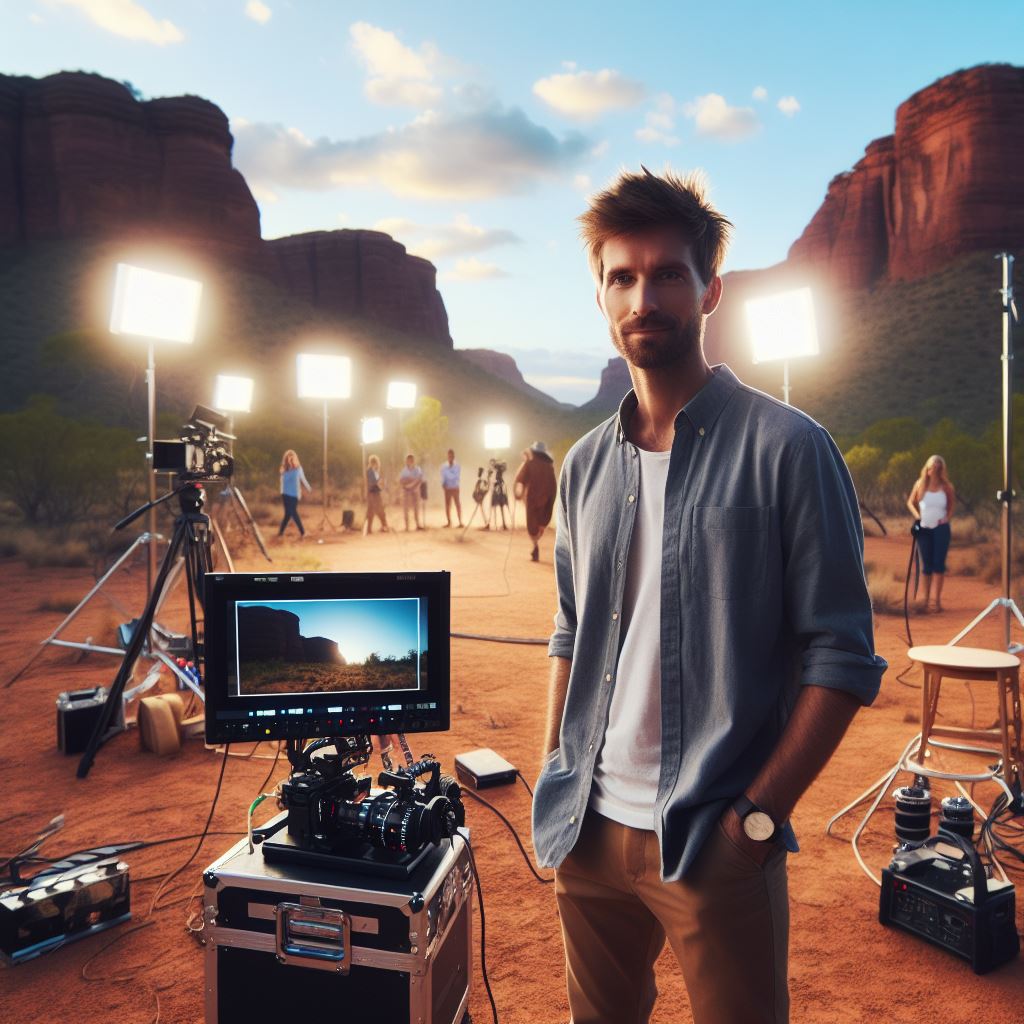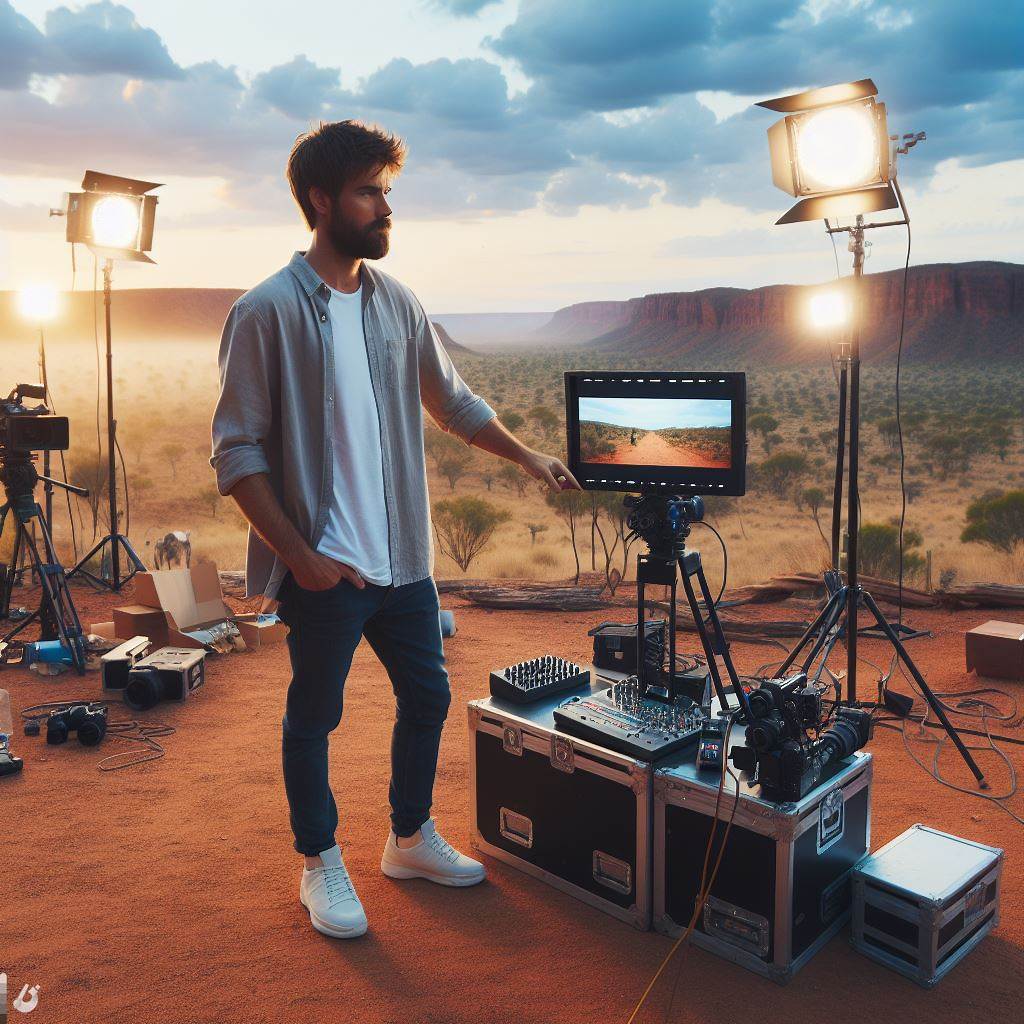Introduction
Documentary Directing Defined
Within the expansive realm of filmmaking, documentary directing emerges as a distinct and nuanced craft. Unlike fictional narratives, documentary directors are tasked with capturing the essence of real-life events, individuals, and their stories.
This intricate process involves a keen eye for detail, storytelling prowess, and an overarching goal of presenting authentic narratives that resonate with audiences.
Overview of the Documentary Industry in Australia
Australia boasts a thriving documentary industry that spans a myriad of genres and subjects.
From mesmerizing wildlife documentaries that explore the unique ecosystems of the continent to thought-provoking social commentaries that delve into pressing issues, Australian filmmakers contribute significantly to the global documentary landscape.
Understanding the dynamic landscape of this industry is crucial for appreciating both the challenges and triumphs that directors face in their pursuit of compelling storytelling.
Australia’s documentary scene reflects a rich tapestry of cultural diversity, providing a platform for filmmakers to explore and showcase narratives that may otherwise go untold.
The industry not only serves as a lens through which we view the world but also as a vehicle for cultural exchange and dialogue.
Purpose of the Blog Post
The primary objective of this blog post is to embark on an in-depth exploration of the multifaceted world of documentary directing in Australia.
By unraveling the intricacies of the industry, we seek to illuminate the experiences of directors, the evolving nature of documentary filmmaking, and the profound impact these narratives have on audiences.
Throughout this journey, we will navigate the challenges, celebrate the successes, and ultimately gain a deeper understanding of the profound role that Australian documentary directors play in shaping our collective cinematic experience.
So, buckle up for an insightful and enlightening expedition through the lens of Australian documentary filmmaking.
The Role of a Documentary Director
Documentary directing involves a range of responsibilities, duties, skills, and key qualities. Understanding these aspects is crucial to excel in this field.
Responsibilities and Duties
- Researching and selecting a compelling documentary topic.
- Creating a clear vision for the documentary and developing a storyline or narrative structure.
- Conducting interviews with relevant individuals and experts to gather information and insights.
- Organizing and coordinating the logistics for the documentary production, including securing film permits.
- Directing the filming process, guiding the camera crew to capture the desired shots.
- Ensuring the smooth progression of the documentary by making informed decisions during editing.
- Collaborating with editors, sound engineers, and other post-production staff to finalize the documentary.
- Promoting the documentary through various channels and engaging with the audience.
Skills Required
To be an effective documentary director, one must possess a diverse set of skills:
- Research skills: The ability to identify and gather relevant information about the chosen documentary topic.
- Storytelling skills: Crafting a compelling narrative that engages viewers and conveys the intended message.
- Interviewing skills: Conducting meaningful interviews to elicit valuable insights from subjects.
- Technical skills: Familiarity with camera equipment, shooting techniques, and editing software.
- Decision-making skills: Making informed choices during filming and editing to enhance the documentary’s impact.
- Communication skills: Effectively conveying ideas and collaborating with team members and subjects.
- Adaptability: Being flexible and adaptable to unexpected situations during filming.
- Organizational skills: Managing the various aspects of documentary production within the given timeline.
Key Qualities of a Successful Documentary Director
Besides technical skills, certain personal qualities contribute to the success of a documentary director:
- Passion: A deep-seated enthusiasm for the subject matter, driving the director’s commitment to the project.
- Creativity: Thinking outside the box to present the documentary in a unique and captivating manner.
- Curiosity: Having a genuine interest in exploring and understanding different perspectives and stories.
- Persistence: Persevering through challenges and setbacks faced during the documentary production.
- Empathy: Understanding and empathizing with the subjects to capture their stories authentically.
- Attention to detail: Paying close attention to every aspect, ensuring a polished and high-quality documentary.
- Open-mindedness: Being receptive to new ideas and feedback, enhancing the overall documentary’s impact.
- Leadership: Motivating and inspiring the team to work cohesively towards a shared vision.
Documentary directing is a multifaceted role that requires a combination of skills, responsibilities, and personal qualities. By understanding and developing these aspects, aspiring documentary directors can effectively bring their vision to life and create impactful films.
Steps in Documentary Directing
Research and concept development
- Choose a compelling topic that will resonate with your audience and spark their interest.
- Conduct thorough research to gather information and gain a deep understanding of your chosen topic.
- Craft a unique angle or perspective that sets your documentary apart from others on the same subject.
Pre-production
- Budgeting and securing funding is crucial to ensure you have the necessary resources to bring your documentary to life.
- Assemble a production team that includes professionals with diverse skills and expertise to contribute to the project.
- Plan shooting schedules and locations carefully to optimize efficiency and minimize disruptions during production.
Production
- Select and work closely with a cinematographer who can capture the vision and aesthetic you want to achieve.
- Conduct interviews with subjects and capture footage that tells a compelling story and provides relevant information.
- Ensure ethical practices by respecting the privacy and consent of your subjects and maintaining professionalism throughout the process.
Post-production
- Organize and catalog all the footage you have collected during production to facilitate the editing process.
- Craft a compelling narrative structure that effectively communicates your message and engages your audience.
- Edit the footage, incorporate sound design, and finalize the documentary to create a polished and impactful final product.
By following these steps, documentary directors can effectively navigate the challenging process of bringing their vision to life. Each stage requires careful planning, attention to detail, and collaboration with a dedicated team to create a documentary that resonates with viewers.
Read: Australian Journalists: Ethics & Challenges
Challenges Faced by Documentary Directors in Australia
Limited funding opportunities
- Securing funding for documentary projects is a major challenge faced by directors in Australia.
- Due to limited government support and scarce private investments, accessing financial resources becomes difficult.
- Documentary directors often have to rely on grants, sponsorships, and crowdfunding to finance their projects.
- The competition for these funding opportunities is fierce, making it even more challenging to secure financial backing.
Finding distribution channels
- Once a documentary is completed, finding suitable distribution channels is crucial for its success.
- Traditional distribution networks, such as television and cinema, are becoming increasingly competitive and difficult to access.
- Documentary directors must explore alternative distribution platforms, such as streaming services and online platforms.
- However, these platforms often have their own challenges, including a saturated market and lower revenue potential.
Addressing cultural and ethical sensitivities
- Documentary directors in Australia face the challenge of addressing cultural and ethical sensitivities in their films.
- Australia is a culturally diverse country, and directors must ensure they present multiple perspectives accurately and respectfully.
- They must navigate sensitive topics and stories with caution, avoiding misrepresentation or exploitation of individuals or communities.
- Balancing the need for truth and storytelling with cultural and ethical considerations requires careful thought and sensitivity.
Overcoming technical and logistical challenges
- Documentary directors encounter various technical and logistical challenges during the filmmaking process.
- Capturing real-life events and interviews in unpredictable environments can be challenging from a technical standpoint.
- Shooting conditions may not always be ideal, requiring directors to adapt and overcome obstacles.
- Logistical challenges arise when coordinating filming schedules, securing permits, and managing budgets efficiently.
In essence, documentary directors in Australia face numerous challenges throughout their filmmaking journey.
Limited funding opportunities make it difficult to finance their projects, forcing directors to seek alternative avenues for financial support.
Finding suitable distribution channels is another hurdle, as traditional platforms become increasingly competitive.
Addressing cultural and ethical sensitivities is crucial in a culturally diverse country like Australia, and directors must navigate these complexities with care.
Lastly, technical and logistical challenges add further complexity to the filmmaking process.
Despite these obstacles, documentary directors in Australia continue to create impactful and thought-provoking films, showcasing their resilience and dedication to the art of documentary storytelling.
Read: Digital Era: Aussie Journalists Adapt

Success Stories of Australian Documentary Directors
Noteworthy documentary directors and their achievements
- David Caesar – Directed “Mallboy” which won the Australian Film Institute Award for Best Documentary.
- Rachel Perkins – Known for directing “Bran Nue Dae” which became one of the highest-grossing Australian documentaries.
- Sophie Hyde – Directed “Life in Movement” which won the Australian Film Critics Association Award for Best Documentary.
- James Ricketson – Gained international recognition for his documentary “The Khmer Rouge Killing Machine”.
- Gillian Armstrong – Directed “Bra Boys”, a critically acclaimed documentary about a surf gang in Sydney.
Exemplary Australian documentaries and their impact
- “The Barkley Marathons” – A gripping documentary that follows the journey of runners attempting a challenging marathon, gaining worldwide attention.
- “That Sugar Film” – Damon Gameau’s eye-opening documentary influenced viewers to reduce their sugar consumption.
- “Sherpa” – Jennifer Peedom’s film shed light on the hardships faced by Sherpas in Mount Everest expeditions, raising awareness globally.
- “The Oasis” – Directed by Ivan Sen, this documentary explored the lives of homeless youth in Sydney, provoking conversations about social issues.
- “Blackfella” – Directed by Rachel Perkins, this documentary examined the history and experiences of Australia’s Indigenous people.
Recognition and accolades received by Australian documentary filmmakers
- Sarah Polley – Nominated for an Academy Award for her documentary “Stories We Tell”.
- Eva Orner – Won an Academy Award for Best Documentary Feature for “Taxi to the Dark Side”.
- Mary MacMahon – Received the Australian Academy of Cinema and Television Arts (AACTA) Award for Best Direction in a Documentary.
- Rolf de Heer – His documentary “Dingo” won the Australian Film Institute (AFI) Award for Best Documentary.
- Rob Nugent – Won the Australian Screen Directors Association (ASDA) Award for Best Director in a Documentary.
Australian documentary directors leave a lasting imprint, showcasing talent and dedication. From David Caesar’s “Mallboy” to Rachel Perkins’ “Bran Nue Dae,” awards and commercial success abound.
Your Personalized Career Strategy
Unlock your potential with tailored career consulting. Get clear, actionable steps designed for your success. Start now!
Get StartedNoteworthy is “The Barkley Marathons,” globally captivating audiences with runners’ determination in a grueling race. Damon Gameau’s “That Sugar Film” prompts reconsideration of sugar consumption, impacting public health significantly.
Jennifer Peedom’s “Sherpa” sheds light on Sherpas’ Everest struggles, sparking conversations and global awareness about exploitative industry practices.
Ivan Sen’s “The Oasis” delves into Sydney’s homeless youth, sparking discussions on social inequality and a call for change.
Internationally, Sarah Polley’s “Stories We Tell” earns an Oscar nomination, showcasing her storytelling prowess. Eva Orner’s “Taxi to the Dark Side” wins an Academy Award for Best Documentary Feature.
Mary MacMahon’s “The Oasis” earns an AACTA Award for Best Direction in a Documentary, contributing to Australian documentary filmmaking recognition.
Australia’s documentary scene thrives with achievements like Rolf de Heer’s “Dingo,” winning the AFI Award for Best Documentary. Rob Nugent earns ASDA’s Best Director in a Documentary recognition.
In summary, Australian documentary directors, recognized locally and globally, inspire with their achievements, impactful documentaries, and dedication.\
Read: Freelance Journalism in Australia
Find Out More: Photography Grants and Funds in Australia
Delve into the Subject: Music and Mental Health in Australia
Resources and Support for Documentary Directors in Australia
Government funding programs and grants
- Screen Australia: The national funding agency provides financial support for documentary projects through various funding programs and initiatives. Directors can apply for financing to cover production, distribution, and marketing costs.
- Create NSW: This government agency offers grants and funding opportunities specifically for filmmakers in New South Wales, including documentary directors. They provide financial support for development, production, and post-production stages.
- Screenwest: For documentary directors based in Western Australia, Screenwest offers funding programs and support services to assist in the development, production, and distribution of projects. They provide grants for scriptwriting, production, and marketing activities.
- Film Victoria: Documentary directors in Victoria can access financial support and grants through Film Victoria. They offer assistance in various stages of production, including development, production, and marketing. Funding is available for both emerging and established directors.
- Screen Queensland: This government agency provides funding programs and initiatives specifically for filmmakers in Queensland, including documentary directors. They offer grants for project development, production, and marketing activities.
Film schools and workshops offering documentary directing courses
- Australian Film, Television, and Radio School (AFTRS): AFTRS offers a range of courses and workshops for documentary directors, providing hands-on training and theoretical knowledge. Their programs cover various aspects of documentary filmmaking, including directing, producing, and storytelling techniques.
- Victorian College of the Arts (VCA): VCA offers documentary directing courses that emphasize practical experience and creative exploration. Students learn from industry professionals and gain hands-on experience in developing and directing their own projects.
- Griffith Film School: Griffith Film School in Queensland offers documentary directing courses that provide students with a comprehensive understanding of the craft. Their programs focus on storytelling, cinematography, and editing techniques specific to documentary filmmaking.
- Sydney Film School: Sydney Film School offers a documentary directing course that equips students with the necessary skills and knowledge to create compelling non-fiction films. Students receive guidance from experienced industry professionals and have access to state-of-the-art facilities.
- Film and Television Institute (FTI) Western Australia: FTI offers documentary directing workshops and programs for aspiring directors. Participants learn about the entire documentary production process and gain practical skills through hands-on exercises and mentorship opportunities.
Networking opportunities and industry associations
- Australian Directors’ Guild (ADG): The ADG is an industry association that represents directors across various genres, including documentary. They offer networking events, educational resources, and advocacy for directors’ rights and interests.
- Australian International Documentary Conference (AIDC): AIDC is a leading documentary industry event in Australia that brings together professionals, including directors, producers, and broadcasters. It provides networking opportunities, pitching sessions, and masterclasses for emerging and established documentary directors.
- Documentary Australia Foundation: This non-profit organization supports documentary filmmakers by offering funding, mentorship, and networking opportunities. They connect directors with potential investors and provide support for project development, production, and distribution.
- State-based documentary associations: Various state-based documentary associations, such as Film Victoria and Screen NSW, provide networking events, workshops, and funding opportunities specifically tailored to documentary directors in each state.
- Documentary Filmmakers’ Group: The Documentary Filmmakers’ Group unites directors and industry professionals, fostering collaboration, knowledge sharing, and project support through networking events and valuable resources.
In short, documentary directors in Australia have access to a wide range of resources and support systems, including government funding programs, film schools offering documentary directing courses, and industry associations providing networking opportunities.
These resources contribute to the development and growth of the documentary filmmaking industry in Australia.
Read: Cultural Diversity in Aussie Media
See Related Content: Australian Directors in Hollywood: Insights
Conclusion
Embarking on a reflective journey, let’s encapsulate the crux of our discourse by providing a thorough recapitulation of the key points expounded upon in the preceding sections.
This summary is intended to solidify and underscore the salient takeaways derived from our comprehensive exploration of the multifaceted realm of documentary filmmaking.
As we extend our discourse, we feel compelled to extend a profound and heartfelt encouragement to aspiring documentary directors in Australia.
Recognizing the rich tapestry of stories waiting to be told, we inspire emerging filmmakers to cultivate their creative acumen, resilience, and distinctive viewpoints.
Within the diverse cultural landscape of Australia, aspiring directors possess the potential to make indelible contributions, amplifying voices that may otherwise go unheard.
The journey toward becoming a documentary filmmaker is a transformative one, requiring passion, dedication, and a commitment to storytelling that resonates with authenticity.
Culminating our deliberations, we issue a compelling call-to-action, beckoning our readers to immerse themselves deeply in the captivating world of documentary directing.
This isn’t merely an invitation; it’s a summons to explore the uncharted territories of narratives waiting to be unearthed.
By engaging with the intricacies of documentary storytelling, readers are not only cultivating their artistic prowess but also becoming vital contributors to the broader cultural dialogue.
The power of documentaries lies not just in their ability to inform and entertain, but also in their potential to shape perspectives, challenge preconceptions, and foster a deeper understanding of the world around us.
In essence, our conclusion serves not as a terminus but as a gateway, inviting all who are captivated by the magic of storytelling to embark on a transformative odyssey within the world of documentary directing.
Stand Out with a Resume That Gets Results
Your career is worth more than a generic template. Let us craft a resume and cover letter that showcase your unique strengths and help you secure that dream job.
Get Hired



